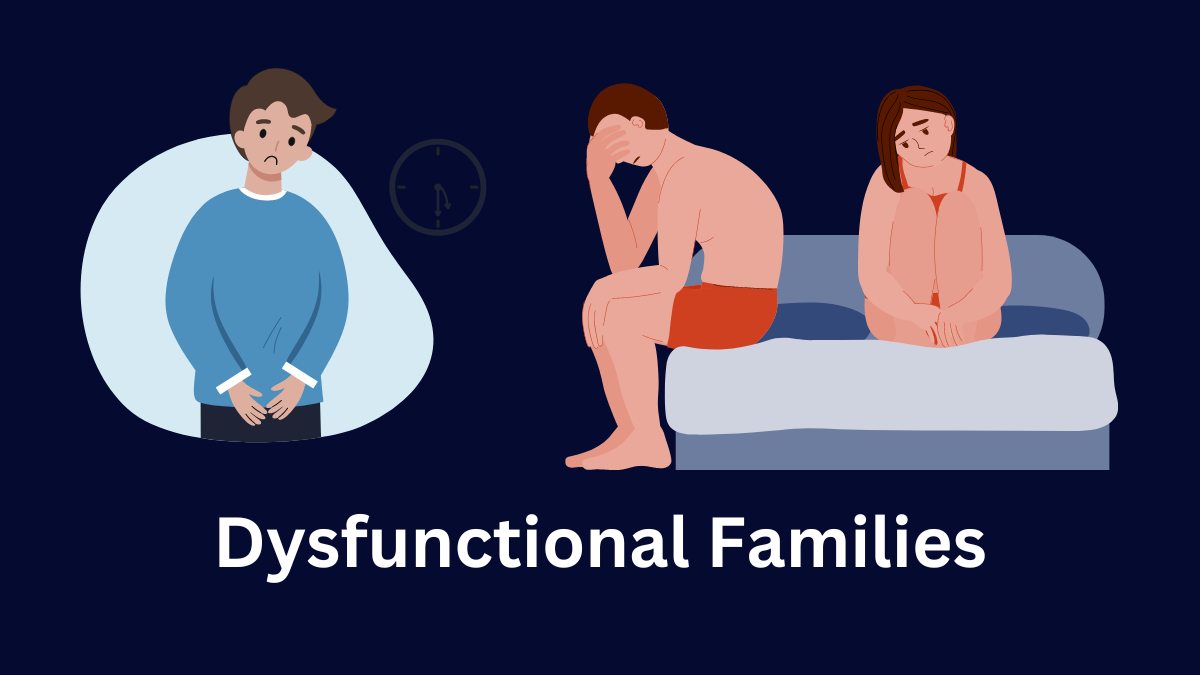No one grows up in a perfect family. In fact, most people come from dysfunctional families. This can be extremely challenging when it comes to our personal lives and relationships.
If you are struggling because of your family history, don’t worry — you are not alone. In this blog post, I will discuss some of the best ways to deal with the challenges that come from having a dysfunctional family.
I will also provide some helpful tips for moving on and creating a better life for yourself!
What is a dysfunctional family and why do they exist?
A dysfunctional family is a family in which the members have difficulty communicating and interacting with each other. This can be due to a variety of reasons, such as emotional abuse, physical abuse, neglect, or addiction.
Dysfunctional families often exist because of unresolved issues within the family unit. These issues can include anger, resentment, envy, and jealousy. Oftentimes, there is also a lack of trust and respect within the family.
Signs that you come from a dysfunctional family
There are a number of signs that can indicate that you come from a dysfunctional family. Some of the most common include:
- Feeling like you can’t do anything right
- Feeling constantly responsible for your parents’ happiness
- Feeling like you have to take care of your siblings, even if they are adults
- Having a lot of difficulties trusting people
- Struggling with relationships and intimacy
- Experiencing a lot of anger and resentment
If you can relate to any of these signs, it is likely that you come from a dysfunctional family.
Types of dysfunctional families
There are many different types of dysfunctional families. Some of the most common include:
Alcoholic families

Alcoholic families are one of the most common types of dysfunctional families. In an alcoholic family, one or more members are addicted to alcohol. This can cause a lot of chaos and turmoil within the family unit.
Alcoholism can be very damaging, both physically and emotionally. If you come from an alcoholic family, it is important to seek help and support.
There are many resources available to you, and there is no shame in seeking help. You deserve to get the support that you need in order to heal the wounds of your past.
Dysfunctional families with an absent parent
In families with an absent parent, one or both parents are typically not present in the home. This can be due to a number of reasons, such as death, divorce, or abandonment.
These families can be very challenging to navigate. The absence of a parent can leave a lot of emotional scars and can be very damaging to a child’s development. If you come from a family with an absent parent, it is important to reach out for help.
Abusive families
Abusive families are another common type of dysfunctional family. In an abused family, one or more members are subjected to physical, emotional, or sexual abuse.
This can be extremely damaging and can have a lasting impact on the victim’s life. If you come from an abusive family, it is important to seek help.
Families with mental illness
In families with mental illness, one or more members are diagnosed with a mental disorder. This can be very difficult for the family to deal with. Mental illness can be very damaging, both physically and emotionally.
The challenges of growing up in a dysfunctional family
Family is supposed to be a safe place, a source of love and support. But for many people, growing up in a dysfunctional family can be a challenge. Dysfunctional families are often characterized by conflict, stress, and instability.
Normal people terrify me, because they haven’t had enough problems in their life to know how to handle problems when they come up. Something little happens and they snap. But being from a dysfunctional family means nothing rattles me. Hey once you’ve driven a drunken father to moms’ parole hearing, what else is there? — Christopher Titus
This can lead to problems such as anxiety, depression, and substance abuse. In addition, children from dysfunctional families often have difficulty forming healthy relationships later in life.
People don’t look at that. They think, “Oh, my kids are going to be fine. My kids are resilient.” But at a certain point, the damage starts. They start to feel pain — and when they feel bad, they start to take painkillers. We want to kill the pain. — Nikki Sixx
They may have trouble trusting others or feel like they are always on the outside looking in. If you grew up in a dysfunctional family, know that you are not alone. There are many people who have overcome similar challenges to build happy and fulfilling lives.
Coping with the challenges of having a dysfunctional family
If you are struggling to cope with the challenges of having a dysfunctional family, here are some tips that may help:
- Seek professional help. If you are feeling overwhelmed or lost, it may be helpful to seek professional help. A therapist can provide you with support and guidance as you work through your issues.
- Connect with others. It can be helpful to connect with others who have gone through similar experiences. There are many support groups and forums available online and in your community. Connecting with others can provide you with much-needed support and understanding.
- Get involved in activities you enjoy. When you are busy and engaged in activities you enjoy, it is less likely that you will dwell on the challenges of your past. Find an activity or hobby that brings you joy and pursue it passionately.
- Move on from the past. One of the most important things you can do is to move on from the past. Accept that what has happened has happened and cannot be changed. Let go of any resentment or anger you may feel towards your parents or siblings. This is not easy, but it is necessary if you want to live a happy life.
How do you improve relationships in a dysfunctional family?
If you are looking to improve your relationships in a dysfunctional family, here are some tips that may help:
- Communicate openly and honestly. One of the most important things you can do is to communicate openly and honestly with your family members. Share your thoughts and feelings honestly and openly. This can be difficult, but it is necessary for healing old wounds.
- Put yourself in their shoes. Try to understand how your family members are feeling and what they may be going through. Empathize with them and try to see things from their perspective. This can help to build bridges between you and your family members.
- Express gratitude. Be grateful for the good moments you have with your family members, even if they are few and far between. This will help to foster a positive relationship with them.
Creating a better life for yourself

One of the best ways to overcome the challenges of having a dysfunctional family is to focus on creating a better life for yourself. This means taking steps to improve your own well-being. Here are some things you can do:
- Make healthy choices. Eat nutritious food, get enough sleep, and exercise regularly. These simple choices can help boost your mood and improve your overall health.
- Set goals. It can be helpful to set goals for yourself, both short-term and long-term. These goals can provide direction and purpose in your life.
- Make positive changes. Work on making positive changes in your life. This may include changing the way you think about yourself, developing new relationships, or starting a new hobby or career.
- Live in the present. One of the best ways to overcome the challenges of having a dysfunctional family is to live in the present. Do not dwell on the past or worry about the future. Focus on the here and now, and enjoy each moment as it comes.
Can people from dysfunctional families succeed in life?
Yes, people from dysfunctional families can succeed in life. Despite the challenges they face, many people from dysfunctional families are able to overcome their difficulties and build happy and fulfilling lives.
There are many resources available to them, including professional help, support groups, and activities they enjoy. By focusing on their own well-being and making positive changes, people from dysfunctional families can create a better life for themselves.
Last words
Making positive changes in your life is not always easy, but it is possible. If you are struggling to cope with the challenges of having a dysfunctional family, know that there is hope. With effort and perseverance, you can overcome these challenges and build a happy and fulfilling life.
